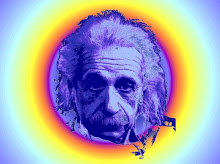At the outset of 12-step recovery, we are urged to take whatever view seems to work best for us of a "power greater than ourselves." It could be our group, or the general notion of goodness and order in the universe, or whatever. But you can't get far in the 12-step literature before you get the sense that something far more specific is meant. Here's from the Big Book:
"Next, we decided that hereafter in this drama of life, God was going to be our Director. He is the Principal; we are His agents. He is the Father, and we are His Children." (p.62)
Screeeeech! Here we've gone from our own notion of a Higher Power to somebody who sounds like good old Yahweh. So I think there's a contradiction within the 12 step literature; sometimes it sounds spiritually all-inclusive and sometimes it sounds covertly Judeo-Christian, if not outright Calvinist.
That's part of the discomfort I have with the adjectives "Greater" and "Higher." Sometimes they are presented as meaning that we need to seek a power outside of our own will, our own notions about ourselves and the world, our own tendency to demand that life live up to our expectations. And to me that makes perfect sense; as an addict my will has been turned against my own well-being. But "Greater" and "Higher" can also mean "better," "holier," "more worthy," and it's hard for someone raised in a Christian culture not to hear them that way. And to that extent, the notion of a "Higher Power" can feed into the sense of shame and worthlessness that got me into addiction in the first place.
So I see "a power greater than myself" as a power bigger than myself, as big as this whole community of recovering people trying to care for themselves and each other, as big as this unthinkably vast universe of which I am a tiny interwoven part, yet which is not other than myself.
Subscribe to:
Post Comments (Atom)

No comments:
Post a Comment